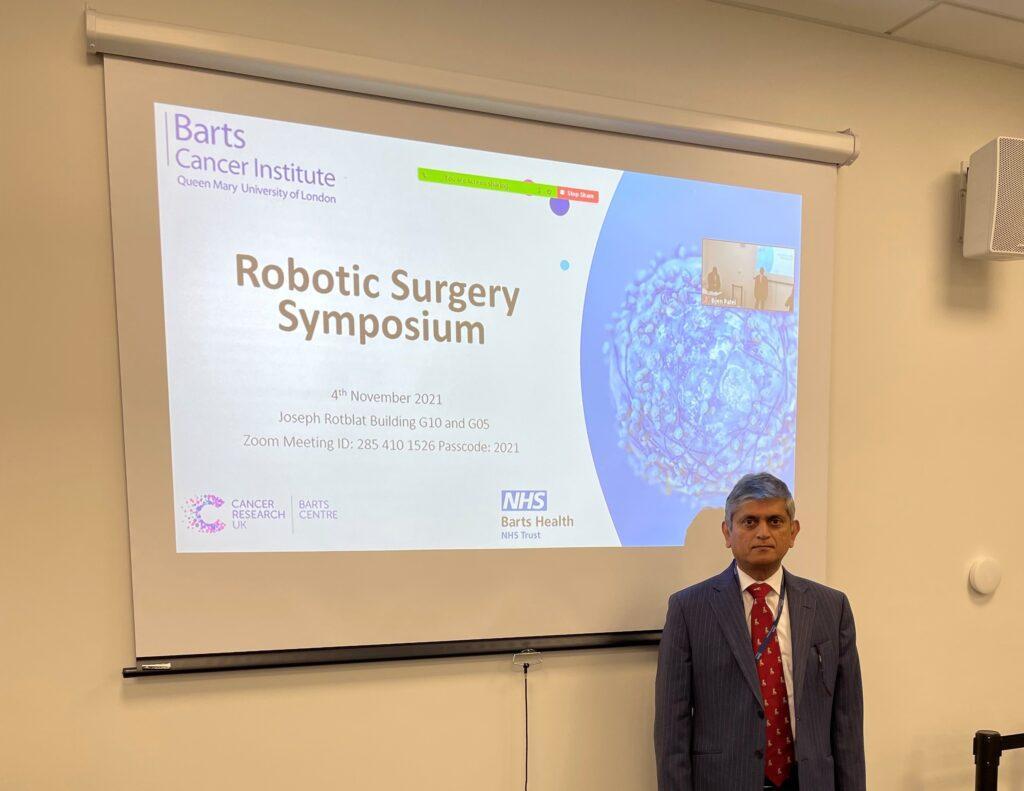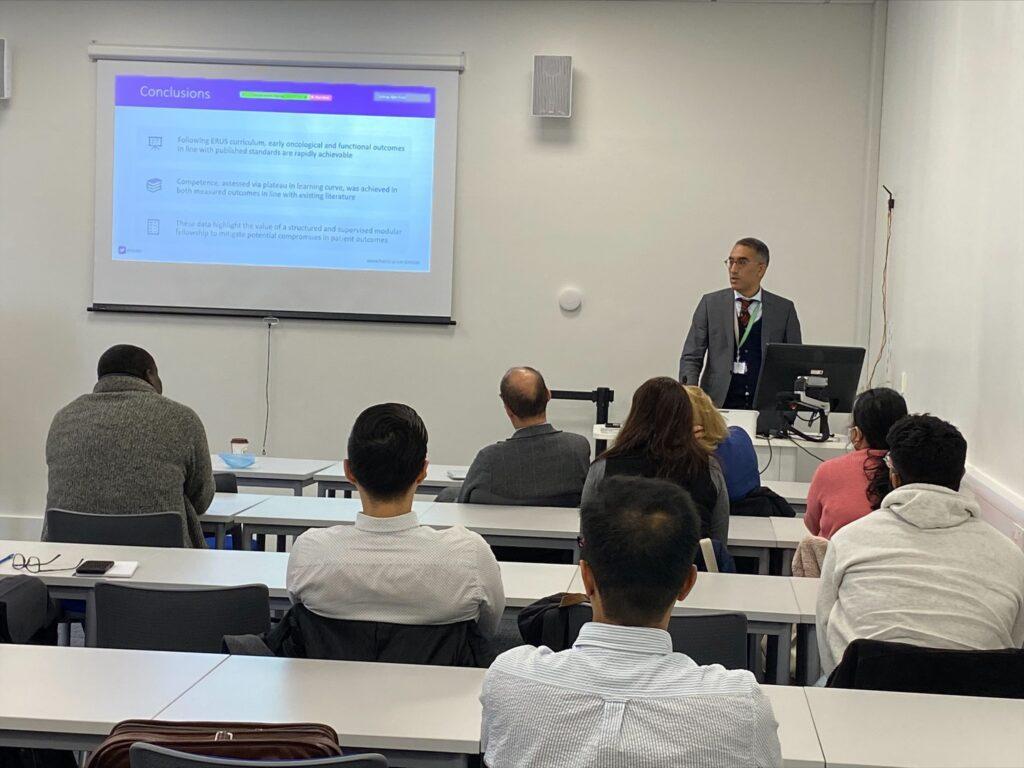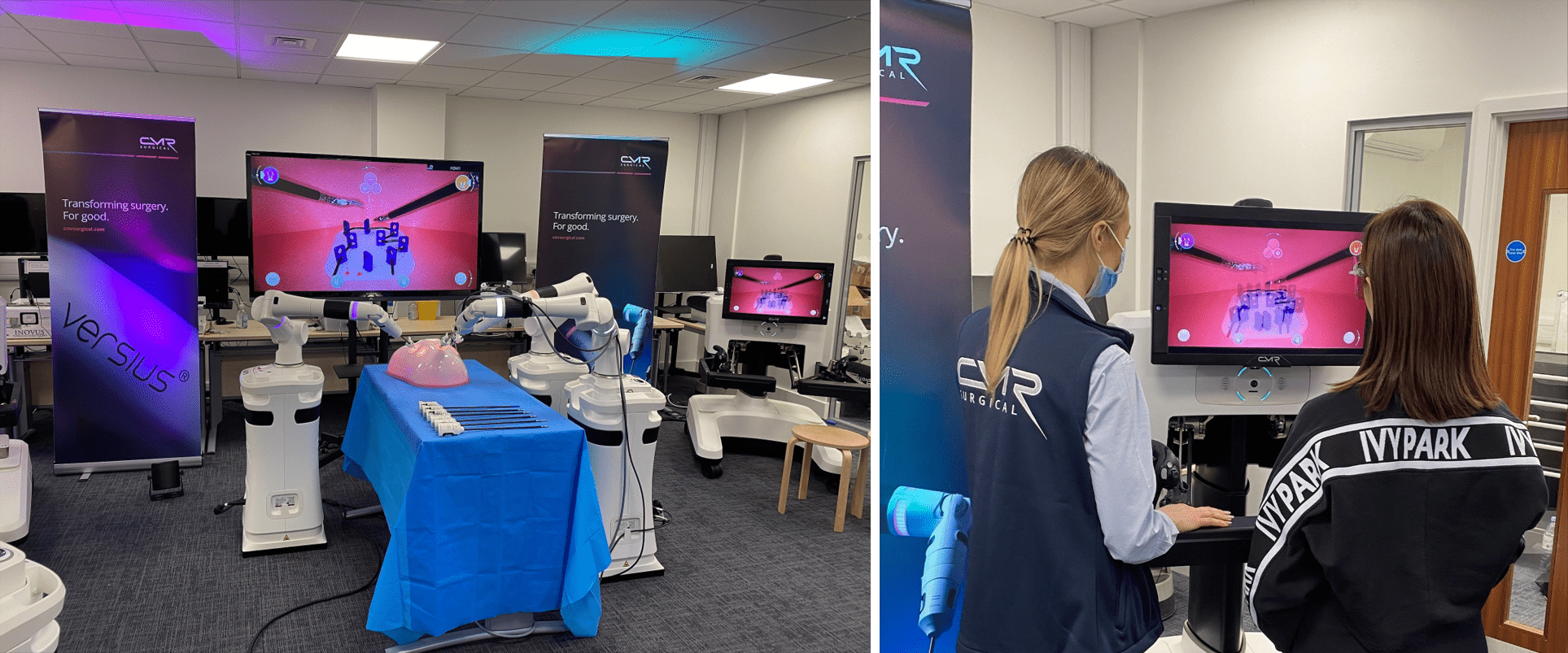Barts Cancer Institute hosts its first Robotic Surgery Symposium
On 4th November 2021, Barts Cancer Institute (BCI) at Queen Mary University of London, in partnership with Barts Health NHS Trust, hosted its first Robotic Surgery Symposium, focused on the use of robotic systems for minimally invasive (keyhole) surgery.
The symposium was a valuable educational experience for the students enrolled on BCI’s MSc Laparoscopic Surgery & Surgical Skills (LSSS) programme as well as NHS surgeons and other healthcare professionals. Delegates had the opportunity to hear from senior expert consultants from Barts Health NHS Trust about their experiences using robotic surgery in their clinical practice.
The use of robotics for keyhole surgery

The event started with an introduction from Professor Bijendra Patel, Professor of Surgery and Director of the LSSS programme at BCI, about how robotics systems can be used to enhance the precision of keyhole surgery using enhanced digital optics and highly dexterous instruments.
Keyhole surgery is a type of surgical procedure that allows surgeons to access the internal body cavities via small skin incisions. Along with small surgical tools, the surgeon uses a narrow instrument called an endoscope, which has a light source and camera that relays images of the inside of the body to a television monitor.
Keyhole surgery has advantages over traditional open surgery, including shorter hospital stays for patients, less pain during recovery and reduced scarring. However, there are some limitations: The surgeon has to adjust to working on the human anatomy from a two-dimensional perspective on a television monitor, the motion of the instruments is restricted, and the ergonomic positioning of the surgeon can be poor.
In robotic surgery, instead of holding the instruments, the surgeon operates robotic arms that hold the surgical instruments, which the surgeon controls via a console. Robotic surgery aims to address the limitations of conventional keyhole surgery by allowing three-dimensional visualisation, mimicking the natural movements of the human wrist, and eliminating tremors to improve dexterity for more accurate surgery.

Keyhole surgery, both with and without robotic systems, is technically demanding and the learning curve for surgical trainees can be steep and long. Training is required throughout a surgeon’s career in order to maintain the skills required for proficiency.
As part of the lecture element of the symposium, which highlighted the breadth of experience in robotic surgery across specialties at Barts Health NHS Trust, we heard from Mr Prabhakar Rajan, Group Leader in BCI’s Centre for Cancer Cell & Molecular Biology and Consultant Urologist at Barts Health NHS Trust.
Mr Rajan presented on the high quality outcomes of independently performed robotic prostatectomy surgery (complete removal of the prostate gland for cancer) after successful completion of a structured fellowship training programme. His talk highlighted the importance of a structured curriculum in learning robotic surgery skills to ensure patient outcomes are not compromised in an early independent experience.
Students gain some hands-on training experience
As part of the symposium, CMR Surgical showcased its new Versius robotics system. With Versius, CMR Surgical aims to empower surgeons to transform how surgery is performed across the world. The students on our LSSS programme had some hands-on experience with Versius by performing virtual training exercises designed to allow surgeons to develop the motor and cognitive skills required to operate the system.
Speaking of the experience, LSSS MSc student, Sidhant said:
“Within a short period of time myself and my colleagues found ourselves intrigued and amazed by what we could accomplish with such little time on the advanced robotics systems.”

Valuable training for the future healthcare workforce
In 2005, Queen Mary became the first university in the world to offer a Master’s degree in laparoscopic surgical skills. The MSc LSSS programme uses simulator technology, virtual reality and augmented reality to help accelerate surgical training and improve the skills essential for building confidence in clinical practice.
Although robotic surgery is now widely adopted across the world for many types of surgery, training is typically reserved for senior surgical trainees and consultants. However, evidence suggests that introducing robotic surgery training early in the surgical training curriculum facilitates rapid development of skills. In the future, Professor Patel and Mr Rajan hope to make robotics surgery training available at the BCI through specially designed short courses or via integration into the LSSS programme curriculum.
Professor Patel said:
“Robotic surgery is typically only learnt as a consultant and never taught to medical students. We are in the process of breaking this tradition and setting an example for others to follow, by teaching this unique skill to our masters students, who represent the future healthcare workforce. Optimisation of human cognition and performance, resulting in democratisation of intelligence and surgical performance can be achieved with a symbiotic relationship between man and machine. Humans are superior because we provide detailed commands for specific tasks and surgical robots are ‘extending human capabilities’ rather than ‘replacing human surgeons’.”
The lectures given at the symposium are available to watch here (access passcode: %B3Ga&QG), with talks from Professor Patel, Mr Sasha Stamenkovic (Consultant Thoracic Surgeon), Mr Vincent Yip (Consultant Hepato-Pancreato-Biliary and General Surgeon), Mr Prasad Patki (Consultant Urological Surgeon), Miss Elly Brockbank (Consultant Gynaecological Oncologist), and Mr Rajan.
Category: Events, General News

No comments yet